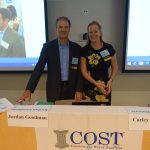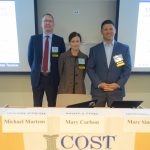The New York State Tax Appeals Tribunal (TAT) issued a decision that addresses sourcing “services” vs. the catch-all “other business receipts” for years prior to New York Tax Reform (tax years beginning prior to 1/1/2015). The TAT found that the taxpayer, who provided electronic litigation support to its clients, was not providing a “service” to its clients. Instead, the TAT found the taxpayer’s receipts were properly classified by the Department of Taxation and Finance as “other business receipts.” However, the TAT found for the taxpayer in determining where other business receipts must be sourced. The TAT found that the receipts should be sourced to where they are earned (as provided in the Department’s regulations) and found that the receipts were earned where the taxpayer performed the work resulting in the income, which was at the taxpayer’s Colorado location and not at the electronic devices of the taxpayer’s customers. Matter of Catalyst Repository Systems, Inc., DTA No. 826545 (Tax App. Trib. July 24, 2019).
Articles Posted in Issues
Presenting at the COST State and Local Tax Workshop for Technology Companies
After a successful SALT Retreat in Napa, Calif., the team headed to Foster City to present on topics at the COST State and Local Tax Workshop for Technology Companies. Carley Roberts, Craig Becker and Jeffrey Vesely spoke on a variety of topics including an overview of new and established local taxes in cities that are aggressively targeting businesses, property tax issues that impact the tech industry, and a question and answer panel with the experts. The presentations were very informative and the Workshop was a success!
The 5 Supermajority Tax Challenges Facing California
(This article originally was published by Law360 on July 22, 2019.)
On July 5, the San Francisco Superior Court issued a pair of rulings in favor of the city and county of San Francisco, finding that two local special taxes introduced by voter initiatives were valid even though they passed with a simple majority vote and not a two-thirds supermajority vote.
COST’s Inaugural 2019 State and Local Tax Workshop for Technology Companies
On July 23-24, members of Pillsbury SALT will lead discussions at COST’s much anticipated state and local tax technology workshop in Foster City, Calif. This one-and-a-half day event promises to deliver in-depth state and local tax content tailored to technology businesses—everything from startups to long established companies. The varied presentations are for those new to tax and those who are tax savvy.
Pillsbury SALT members will lead discussions on a number of topics, including:
- “Beware of the Locals—They Might Take You by Surprise” (Carley Roberts)
- “All Things Property Tax for Tech Companies” (Craig Becker)
- “Ask The Experts” (Jeffrey Vesely)
For more information and to register, please visit the event page.
Gross! Portland, Oregon, Targets Large Retailers with New Gross Receipts Tax
 As of January 1, 2019, large retailers doing business in Portland, Ore., are subject to a new 1% gross receipts tax dubbed the “Clean Energy Surcharge.” This new tax is imposed on all businesses subject to the Portland business license tax that have annual retail receipts of over $1 billion and at least $500,000 annual retail receipts attributable to Portland. This tax has complications that qualifying large retailers should keep in mind. For instance, the tax is unconventionally broad and applies to, among other things, services (generally, without enumeration), interest income from lending, and sales of houses by builders. The tax uses current-year receipts, as opposed to prior-year receipts, to determine whether the thresholds are met, so businesses that may not be sure in advance if they will meet the thresholds should take caution accordingly. Finally, as is often the case with localities, Portland intends to apply its business license tax apportionment rule (income-producing activity approach), which differs from that of the State (market-based sourcing).
As of January 1, 2019, large retailers doing business in Portland, Ore., are subject to a new 1% gross receipts tax dubbed the “Clean Energy Surcharge.” This new tax is imposed on all businesses subject to the Portland business license tax that have annual retail receipts of over $1 billion and at least $500,000 annual retail receipts attributable to Portland. This tax has complications that qualifying large retailers should keep in mind. For instance, the tax is unconventionally broad and applies to, among other things, services (generally, without enumeration), interest income from lending, and sales of houses by builders. The tax uses current-year receipts, as opposed to prior-year receipts, to determine whether the thresholds are met, so businesses that may not be sure in advance if they will meet the thresholds should take caution accordingly. Finally, as is often the case with localities, Portland intends to apply its business license tax apportionment rule (income-producing activity approach), which differs from that of the State (market-based sourcing).
The Evolution of Software as a Service Taxes Post-Wayfair
(This article originally was published by Law360 on May 17, 2019.)
In the last year, several state legislatures have enacted laws and several state courts have published decisions on whether software as a service, or SaaS, is subject to sales and use tax. These developments impact many SaaS providers, especially due to the expanded nexus provisions that many states are enacting after the United States Supreme Court’s South Dakota v. Wayfair Inc. decision.1 The states have gone in different directions—Indiana enacted legislation exempting SaaS, while Iowa and Rhode Island began taxing SaaS. The Massachusetts Appellate Tax Board and the Pennsylvania Board of Finance and Revenue have both issued decisions clarifying the taxability of SaaS offerings.
“California Municipal Gross Receipts Taxes”
Craig A. Becker presents “California Municipal Gross Receipts Taxes” at the Palo Alto Chamber Business Connections Group event.
“The Taxation of Section 965 Deemed Repatriation”
Carley Roberts presents on “The Taxation of Section 965 Deemed Repatriation” at COST’s Spring Audit Session & Income Tax Conference 2019 on May 1.
California Business Tax May Provide High Court Nexus Test
(This article was originally published by Law360 on April 16, 2019.)
In recent years, many have openly criticized California for its income tax litigating position involving out-of-state companies that hold passive, minority interests in pass-through entities doing business in California. The state argues these out-of-state companies are doing business in California solely by virtue of their passive, minority investment in pass-throughs that conduct business in California. The state has lost the issue twice in the last two years. Most recently in September 2018 before an administrative appellate body in a nonprecedential decision involving a 25% passive ownership interest and the other in 2017 at the California Court of Appeal in a published decision involving a 0.2% passive ownership interest.
 SeeSALT Blog
SeeSALT Blog













